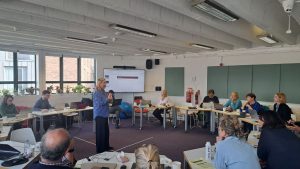PartnerUp Poster
Check out our poster to explore the possibilities of stakeholder collaboration towards Upskilling Pathways.
Accessibility Tools
Written by PM on . Posted in News.
Check out our poster to explore the possibilities of stakeholder collaboration towards Upskilling Pathways.
Written by PM on . Posted in News.
The online study visit in Italy held on April 12th, 2023, facilitated a comprehensive understanding of challenges in implementing effective upskilling pathways for adult learners thanks to the contribution of the different stakeholders: INAPP – National Coordinator of the Agenda for Adult Learning; ERASMUS+ Italian National Agency for Adult Education; RIDAP (National Network of Public Centers for Adult Education); RUIAP (University Network for Lifelong Learning); ANPAL (Public National Agency for Active Labour Policies); EDAFORUM (Forum of ALE Associations/Networks); Repubblica Digitale (Governmental initiative to develop and strengthen digital competences).
Key hurdles include governance complexities, resource allocation, and stakeholder collaboration:
Cooperation among stakeholders, including government agencies, educational institutions, non-profit organisations, employers, and individuals, is pivotal. However, gaps in interregional cooperation and recognition of prior learning persist, necessitating enhanced communication, resource sharing, and policy alignment.
Italy’s commitment to collaborative efforts underscores its dedication to advancing adult education and upskilling pathways for societal benefit. Leveraging diverse stakeholders’ expertise and resources can pave the way for a more inclusive, adaptable, and resilient adult education ecosystem.
Written by PM on . Posted in News.

The PartnerUp project focuses on Partnerships and Stakeholder Engagement for Upskilling Pathways and recently hosted its second online European Study Visit on January 23rd 2024. The online event served as a platform to gather key insights into institutional perspectives, the influential role of social partners, and the vital engagement of the social sector for the effective implementation of Upskilling Pathways.
Sofie Doskorova (the Directorate-General for Employment, Social Affairs, and Inclusion at the European Commission) shared invaluable institutional perspectives, providing a comprehensive understanding of the foundations necessary for successful upskilling initiatives.
Rosella Benedetti (Federazione UILSCUOLA RUA) delved into the crucial involvement of the social sector, highlighting strategies and positive outcomes for upskilling pathways.
Robbie Stakelum (Social Platform) explored the crucial involvement of the social sector in upskilling pathways. Stakelum discussed strategies and positive outcomes, underlining the significance of the social sector’s active participation in the overall process.
The PartnerUp project is dedicated to enhancing the implementation of Upskilling Pathways for the benefit of adult learners, aiming to increase their participation in lifelong learning opportunities. The project employs methods such as peer learning and study visits, allowing partners to learn from one another and transfer successful practices to their respective contexts. The study visits facilitate the exchange of knowledge and best practices, offering participants insights into different structures in partner countries and various ways of engagement with partners, stakeholders, and adult learners. The next face-to-face study visit is scheduled to take place in Nicosia, Cyprus, on February 14th, 15th and 16th, with CARDET serving as the host organisation.
Written by PM on . Posted in News.
Check out our Second Newsletter!
Written by PM on . Posted in News.
Our first Newsletter is published!
Written by PM on . Posted in News.

Partner UP consortium held a transnational partner meeting and study visit in Dublin, Ireland on Thursday, September 28th, and Friday, September 29th. The meeting was hosted by AONTAS, our Irish partner, at the Digital Hub.
On the first day, the primary goal of the meeting was to complete the national and European stakeholder analyses and begin work with the development groups in the upcoming months. The partners collaborated and designed the workload during the meeting while preparing guidelines for future endeavours, especially because of the ambitious work plan that follows in the next few months. A peer review of the country reports was conducted as a concrete result, providing a foundation for the next tasks.
In the afternoon, a visit took place to the Dublin 8 Community Education Centre (D8CEC), where we met up with two educators, who were previously learners themselves, to discuss their operations. The centre provides a second chance for adult learners. As explained in their website:
“D8CEC is a QQI quality-assured centre: our courses are nationally accredited and of a consistently high standard. They are available part-time and generally run from September to May. Our courses are provided in the community for the community and as far as possible by suitably qualified members of the community. Indeed, many of our tutors have themselves completed courses at D8CEC in the past” (D8CEC).
The courses offered at the Dublin 8 Community Education Centre focus on digital skills, and mathematics with language and literacy. However, they do not impose any time limit on the learners’ learning process. Throughout the year, the centre can accommodate approximately 200 to 300 students with a course duration of approximately 16 weeks where the learners have the freedom to ask and co-create the agenda.
After the meeting with the educators at D8CEC, Conor Thompson, Policy officer at AONTAS, presented the Irish Education System. The presentation focused on the history and the current education reality in Ireland. It provided many topics of discussion between the partners, especially the heavy involvement of the Church and the lack of vocational education and skills in the early school years.
On the second day, the focus drifted from the development groups to general events in the next half a year. The partners discussed the dissemination activities that need to be implemented, the next study visits and peer learning activities taking place online (the first one being an online collaboration between EAEA and eucen on the 23rd of January) and the next transnational partner meeting, taking place in February 2024 in Cyprus.
If you feel the project is of interest to you, you are invited to learn more about it and get involved! You can stay updated by following our project page or feel free to contact us directly for further information. We are excited to have you join us on this journey!
